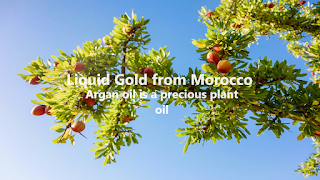Argan Oil: Liquid Gold from Morocco
Argan oil is a precious plant oil extracted from the kernels of the argan tree, a thorny and resilient species native to Morocco and southwestern Algeria. Often referred to as "liquid gold," this oil has been prized for centuries for its culinary, cosmetic, and medicinal properties.
Why is it so expensive?
Several factors contribute to argan oil's high price tag:Scarcity: Argan trees are slow-growing and only thrive in a specific arid climate, limiting their cultivation.
Labour-intensive processing: Traditionally, women's cooperatives extract the oil using a labour-intensive, multi-step process involving hand-cracking the argan nuts, grinding the kernels, and cold-pressing the oil.
Nutritional value: Argan oil is packed with antioxidants, fatty acids (including oleic acid and linoleic acid), and vitamin E, all of which contribute to its health benefits.
Processing Argan Oil:
Traditionally, argan oil is produced using a centuries-old method:Harvesting: Women collect the argan fruits from the ground after they fall naturally.
Drying: The fruits are dried in the sun for several weeks.
Shelling: The dried fruits are cracked open by hand to reveal the argan nuts.
Roasting (optional): Some producers roast the argan nuts for a richer flavour and aroma.
Grinding: The argan nuts are ground into a fine paste using stone mills.
Cold-pressing: The paste is pressed slowly and carefully using traditional wooden presses or screw presses to extract the oil.
Filtering: The raw oil is filtered to remove any impurities.
Modern producers may use mechanized equipment for some steps, but the core cold-pressing process remains largely unchanged.
Medicinal Properties:
Research suggests that argan oil may offer various health benefits, including Heart health: Argan oil's monounsaturated fatty acids may help lower LDL (bad) cholesterol and raise HDL (good) cholesterol, potentially reducing the risk of heart disease.
Diabetes management: Studies suggest argan oil may improve blood sugar control in people with type 2 diabetes.
Skin health: Argan oil's antioxidants and anti-inflammatory properties may help reduce the signs of ageing, moisturize dry skin, and treat acne.
Wound healing: Argan oil may promote wound healing and reduce scarring.
Commercial Applications:
Beyond its culinary and medicinal uses, argan oil is also used in various commercial applications:Cosmetics: Argan oil is a popular ingredient in hair care products, moisturizers, and soaps due to its nourishing and moisturizing properties.
Food industry: Argan oil's nutty flavour and health benefits make it a sought-after ingredient in salad dressings, dips, and cooking oils.
Dietary supplements: Argan oil capsules are marketed as a source of antioxidants and essential fatty acids.
Argan oil is a versatile and valuable product with a rich history and diverse applications. Its high price reflects its scarcity, labour-intensive processing, and unique nutritional profile. From culinary uses to cosmetic and medicinal benefits, argan oil continues to be a cherished treasure from Morocco.
Why is it so expensive?
Several factors contribute to argan oil's high price tag:Scarcity: Argan trees are slow-growing and only thrive in a specific arid climate, limiting their cultivation.
Labour-intensive processing: Traditionally, women's cooperatives extract the oil using a labour-intensive, multi-step process involving hand-cracking the argan nuts, grinding the kernels, and cold-pressing the oil.
Nutritional value: Argan oil is packed with antioxidants, fatty acids (including oleic acid and linoleic acid), and vitamin E, all of which contribute to its health benefits.
Processing Argan Oil:
Traditionally, argan oil is produced using a centuries-old method:Harvesting: Women collect the argan fruits from the ground after they fall naturally.
Drying: The fruits are dried in the sun for several weeks.
Shelling: The dried fruits are cracked open by hand to reveal the argan nuts.
Roasting (optional): Some producers roast the argan nuts for a richer flavour and aroma.
Grinding: The argan nuts are ground into a fine paste using stone mills.
Cold-pressing: The paste is pressed slowly and carefully using traditional wooden presses or screw presses to extract the oil.
Filtering: The raw oil is filtered to remove any impurities.
Modern producers may use mechanized equipment for some steps, but the core cold-pressing process remains largely unchanged.
Medicinal Properties:
Research suggests that argan oil may offer various health benefits, including Heart health: Argan oil's monounsaturated fatty acids may help lower LDL (bad) cholesterol and raise HDL (good) cholesterol, potentially reducing the risk of heart disease.
Diabetes management: Studies suggest argan oil may improve blood sugar control in people with type 2 diabetes.
Skin health: Argan oil's antioxidants and anti-inflammatory properties may help reduce the signs of ageing, moisturize dry skin, and treat acne.
Wound healing: Argan oil may promote wound healing and reduce scarring.
Commercial Applications:
Beyond its culinary and medicinal uses, argan oil is also used in various commercial applications:Cosmetics: Argan oil is a popular ingredient in hair care products, moisturizers, and soaps due to its nourishing and moisturizing properties.
Food industry: Argan oil's nutty flavour and health benefits make it a sought-after ingredient in salad dressings, dips, and cooking oils.
Dietary supplements: Argan oil capsules are marketed as a source of antioxidants and essential fatty acids.
Argan oil is a versatile and valuable product with a rich history and diverse applications. Its high price reflects its scarcity, labour-intensive processing, and unique nutritional profile. From culinary uses to cosmetic and medicinal benefits, argan oil continues to be a cherished treasure from Morocco.




Comments